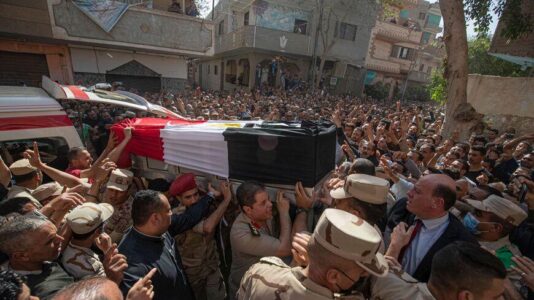
Islamic State terrorist group claimed the terror attack near Suez Canal
On May 7, a group of militants attacked a water pumping station east of the Suez Canal, leaving one officer and 10 troops dead, while five others were injured in the clashes that subsequently erupted, according to Egyptian military spokesperson Gharib Abdel Hafez.
On May 8, Egyptian President Abdel Fattah al-Sisi met with the Supreme Council of the Armed Forces to discuss the attack, one of the deadliest against Egyptian forces in the Sinai in recent years. Sisi instructed the army to pursue the terrorists and continue combatting terrorism in all its forms.
On May 9, the Islamic State claimed responsibility for the armed attack via Telegram.
Maher Farghali, a freelance researcher on terrorist groups, told Al-Monitor that the May 7 terrorist attack reveals qualitative changes in the militants’ strategy in Sinai.
“Terrorists have targeted a civilian facility in Sinai for the first time. Their attacks in the past would usually focus on army outposts in the cities of Arish, Rafah, and Sheikh Zuweid in North Sinai,” Farghali said.
Just days after the attack at the water pumping station, on May 11, one Egyptian officer and four soldiers were killed in another attack on a military checkpoint near the city of Rafah in North Sinai. No group has claimed responsibility so far.
Brig. Gen. Khaled Okasha, head of the Egyptian Center for Strategic Studies, told Al-Monitor that the terrorist organizations’ targeting of civilian facilities with limited security shows that they have weakened.
On Feb. 9, 2018, the Egyptian military launched a major operation to eliminate terrorists from Sinai. The operation, dubbed Sinai 2018, has tightened state control over ports and killed over 1,000 alleged terrorists so far.
Okasha said, “Operation Sinai 2018 has been a success. Terrorists have not been able to carry out attacks such as the al-Rawdah Mosque attack, which killed hundreds of worshippers since the operation was launched.”
On Nov. 26, 2017, gunmen targeted the al-Rawdah Mosque in the city of Arish in North Sinai, killing over 300 worshippers in the deadliest attack in Egypt’s modern history.
Okasha commented that in the wake of the fall of the Muslim Brotherhood in Egypt, IS attempted to sow chaos and instability in Sinai. He explained that completely eliminating IS will take time, as the Sinai Peninsula’s geography offers terrorists convenient places to hide and carry out their plans.
Hoda al-Mallah, director of the International Center for Economic Consulting and Feasibility Studies, told Al-Monitor that the May 7 attack, which occurred near the Suez Canal, may harm the canal’s international reputation.
The Suez Canal is Egypt’s second source of foreign income after tourism, generating annual revenues of approximately $5.5 billion. About 12% of the total global trade passes through the canal, while exports of crude and refined oil and gas through the waterway represent 5% to 10% of global shipments.
Mallah noted that should there be any more such attacks, people could lose confidence in the security and stability of the Suez Canal, one of the most important sources of Egypt’s national income, at a time when Egypt is suffering from severe economic issues including a clear decline in tourism and a decrease in cash reserves following the Russian-Ukrainian war.
Egypt was greatly affected by the Russian attack on Ukraine as the import of Russian and Ukrainian wheat was suspended and tourism dropped. Russians and Ukrainians used to make up 30% to 40% of tourists to Egypt.
Mallah called on the international community to unite, cooperate and support Egypt in its war against terrorism as attacks on civilian facilities will harm not only Egypt, but the entire global economy.
On May 9, Sisi met with Lt. Gen. Michael Corella, commander of the US Central Command, during his visit to Cairo and discussed military and security cooperation between Egypt and the United States to combat terrorism through joint training programs and securing borders.
Source: Al Monitor





